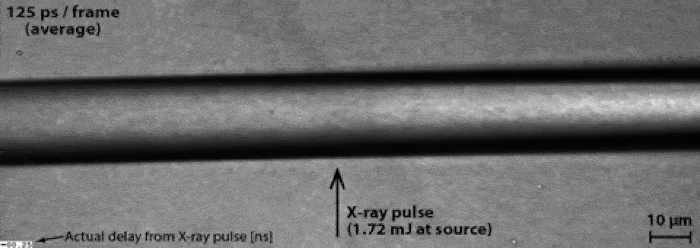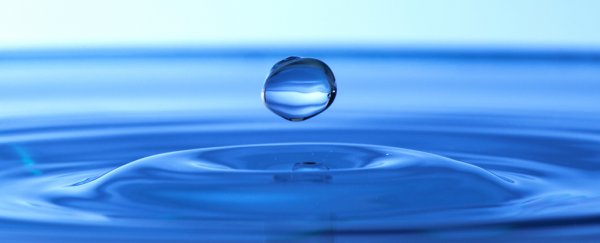Sound isn't just something we hear. It's a formidable physical phenomenon – a wave of pressure that reverberates through the air around us.
But the medium sound moves through doesn't have to be air. Incredibly loud sounds can also travel through water, sometimes even being the result of particularly noisy fish. But if you really want to make a racket under the waves, experts recommend lasers.
In a new experiment, researchers at the Department of Energy's SLAC National Accelerator Laboratory used an X-ray laser to produce an extremely loud noise.
It was so extremely loud, in fact, the team says it was right at the limit of being the loudest possible sound that could ever be produced in water, theoretically speaking.
"It is just below the threshold where [the sound] would boil the water in a single wave oscillation," physicist Claudiu Stan, now with Rutgers University Newark, told Physics Buzz.
 Shockwaves travelling away from microbubble-filled regions in the microjet. (Claudiu Stan/Rutgers University Newark)
Shockwaves travelling away from microbubble-filled regions in the microjet. (Claudiu Stan/Rutgers University Newark)
The device the researchers used to do this was the Linac Coherent Light Source (LCLS): an insanely powerful X-ray laser that can do things like create 'molecular black holes' and heat water to 100,000 degrees Celsius (about 180,000 degrees Fahrenheit) in less than a millionth of a millionth of a second.
Here, the researchers wanted to use the LCLS to learn more about how high-intensity sound waves that produce very loud sounds might affect materials and biological samples.
As part of the research, the team blasted incredibly tiny liquid microjets of water thinner than a strand of hair in a vacuum chamber with focused X-ray pulses of photons.
When the laser intercepted the water stream, ultrafast ionisation took place in the microjet as the water was heated, vaporising the liquid and creating a cylindrical shock wave that propagated along the jet.
According to the researchers, these shock waves had initial peak pressures that correspond to extreme sound intensities and sound pressure levels above 270 decibels (dB) – louder than an eardrum-rupturing jet plane taking off, or even a rocket launch.
That's pretty crazy, and the results suggest it's also not possible to go louder than this in water, due to the way the water breaks down if the pressure exerted by the shockwaves becomes any greater.
"The amplitudes and intensities were limited by the wave destroying its own propagation medium though cavitation, and therefore these ultrasonic waves in jets are one of the most intense propagating sounds that can be generated in liquid water," the researchers explain in their paper.
"We estimate that the amplitudes of these pressure waves exceed the largest peak-to-peak pressures obtained with focused ultrasonic waves, and may thus be the highest intensity sounds generated to date in liquid water."
The findings are reported in Physical Review Fluids.
